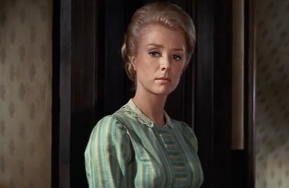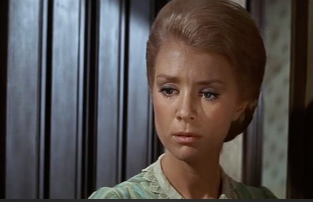Farmer Johnny Cobb (James Stewart) takes his two boys to town to fetch a doctor for his wife Henrietta (Jacqueline Scott) who is in labor, but also to attend a church service and stay out of the way during the birth.
Bob Larkin (Henry Fonda) and his gang ride into the sleepy little town. Although Bob is nursing a gunshot wound and wants nothing but rest, his posse have made up their minds to indulge in intoxication, destruction of personal property, physical violence with the menfolk, and sexual violence with the women. Larkin warns his men to stay out of trouble, but he literally allows them to get away with murder before all is said and done.
We soon discover that Johnny's wearing a homemade sheriff's badge, made with pride by his two boys, and signifying his role as honorary sheriff in the town. But the town's never had any trouble before and Johnny's never had to lead. He's clearly uncomfortable around the violent gang and just wants to peacefully reason with them.
 |
| Inger Stevens in Firecreek, 1968. |
Evelyn is a widow living with her disabled grandfather. We learn about her deceased husband in an exchange between Bob and herself.
Evelyn: He was a wagon scout. Killed in the same Indian raid that crippled my grandfather.
Bob: Did he mean somethin' to ya?
Evelyn: We were good friends.
Bob: How long ago he die?
Evelyn: Ten years.
Bob: And you've buried yourself in this town ever since.
 |
Evelyn, developing feelings for the outlaw, pleads with Bob Larkin to end the siege on Firecreek.
Evelyn: You're humiliating this town.
Bob: It's nothing I want.
Evelyn: I thought you placed such great importance on leading.
Bob: Your so-called town sheriff and me are quite a bit alike.
Evelyn: How do you see that?
Bob: We're both riding a greased pig. Have to hold on. I don't know what's going through his mind but in my case I'm not expected to leave behind one of my men with a bullet in his back.
Evelyn: And you placate these animals you call men?
Bob: Certain things are expected of me.
Evelyn: Well, why not do the unexpected? Ride on alone. You don't need these killers.
Bob: Maybe I been alone. Didn't like it. Maybe I don't have your temperament to accept another empty day.
Sheriff Johnny Cobb must face Bob Larkin and his men alone in the empty streets of Firecreek. Will Johnny fight alone or will the citizens come out and defend their home? Will Bob Larkin have a change of heart or will he continue to be an unapologetic killer?
Although she, as in all of her western roles, plays second fiddle to the men, Inger is essential to this film. Through her character Evelyn's words and actions, Inger has some of the most pivotal scenes. Inger possesses understated power, not just in Firecreek but in every single one of her performances.
Firecreek is my favorite of Inger's westerns. It is a well-written, touching drama that draws its viewer along in anticipation. James Stewart and Henry Fonda are flawless not only as the leaders at war with each other, but as men at war in their own hearts.




